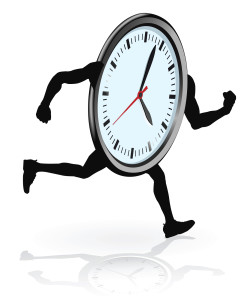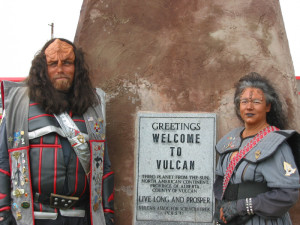When you work in the meeting business in the second most expansive country in the world (that would be us), you in essence become a professional traveler—a slave to airline schedules,  connoisseur of the latest travel apps, suitcase packer extraordinaire and master time zone converter all rolled into one George Clooney-like (at least in my case) airport refugee.
connoisseur of the latest travel apps, suitcase packer extraordinaire and master time zone converter all rolled into one George Clooney-like (at least in my case) airport refugee.
Of course, all this to-ing and fro-ing from meetings across the second most expansive nation on the third rock from the sun can be a tad stressful. But I’ve got some exciting insight for you weary meeting road warriors.
Last week I flew from Calgary, Alberta to a conference in Kelowna, B.C., in the beautiful Okanagan Valley. Time of departure: 2:30 p.m. Time of arrival: 2:30 p.m. And who says time travel doesn’t exist?!
To me, this is one of the truly wondrous joys of travel. Who else, save Captain Kirk and his fellow Star Trekkers, can claim to arrive at a distant destination at the exact time they departed? This, my fellow jet trekkers, is our generation’s version of “beaming up.”
Although probably not as painful as having your molecules deconstructed, beamed across space, and reconstituted like a bowl of instant chicken soup, our version of time travel does come with its own inherent problems, most noticeably, jet lag.
Of course, in the old days jet lag wasn’t an issue, primarily because people didn’t move very fast. Sure, folks complained of “horse lag” or “ass lag”, however their concerns pale in comparison to the modern-day jet setter (not to be confused with the modern day Irish setter, a member of the canine clan that travels extensively back and forth throughout Ireland).
But today, people whip back and forth across time zones so fast it’s possible for them to arrive back at where they started even before they’ve left! No wonder our bodies often lag behind our brains or our brains lag behind our bodies. (And in some rare instances, jet lag has even resulted in suitcases lagging behind their owners).
Most travelers who “boldly go where pretty much everyone has gone before and few really wish they had gone in the first place” are familiar with the more common symptoms of jet lag: our  internal sleep clocks get thrown out of whack; our stomachs get hungrier earlier than they should; we show up a day late for our speaking engagements.
internal sleep clocks get thrown out of whack; our stomachs get hungrier earlier than they should; we show up a day late for our speaking engagements.
Fortunately, there are many remedies to overcome the symptoms of jet lag, such as drinking lots of water, avoiding alcohol and caffeine, and, perhaps the cleverest strategy of all, staying home.
Changing your watch to the correct local time is also recommended by travel experts, particularly if you plan to stay in the different time zone for several months. (And if you own a watch like mine, changing the time on a flight from Vancouver to Hamilton can easily provide a good three hours of rollicking entertainment).
So until we’ve perfected that whole “beaming up” thing (I’m working on it part time in my basement, by the way), we’ll just have to learn to adapt.
And as a wise meeting planner once told me, “Those who fail to adapt, are doomed to stay in their own time zones.” Now I may not have this quote exactly right, you see my body’s three hours ahead of my brain because I just flew from Halifax to Calgary, but then I went to Saskatoon, so I lost an hour of the three that I had gained. But then I had to go to B.C., so I gained back another hour. But then I talked to someone from Newfoundland and totally got confused.
So to be honest, I’m not even sure what year it is anymore.
Michael Kerr is a Canadian Hall of Fame Speaker, highly in-demand international keynote speaker, and the creator of the Culture Leadership Online Academy. Michael is also the author of 8 books, including: The Humor Advantage: Why Some Businesses Are Laughing All the Way to the Bank; Hire, Inspire, and Fuel Their Fire; and The Jerk-Free Workplace: How You Can Take the Lead to Create a Happier, More Inspiring Workplace. www.MikeKerr.com


